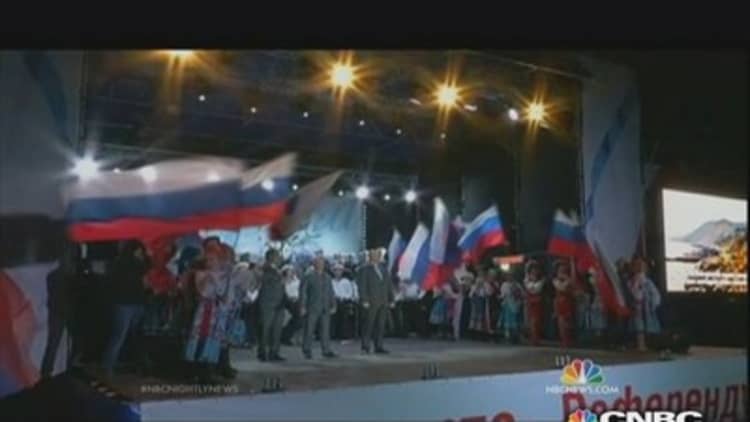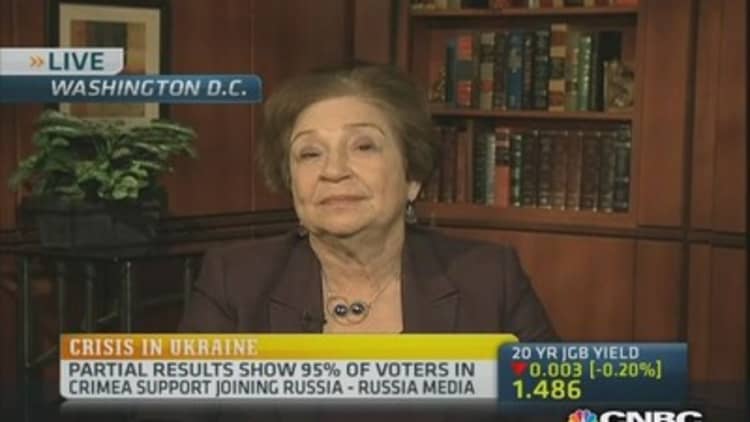
Crimea, it's the most serious crisis in relations between the West and Russia since the Cold War. And until it's over, risk aversion should remain the play of the day, analysts say.
On Sunday, Crimea voted overwhelmingly in favor of leaving Ukraine and annexation by Russia in a referendum that Europe and the U.S. have said was illegal and would trigger sanctions.
(Read more: No surprises in Crimea vote, now what?)
The outcome of the vote was no surprise to financial markets. Still worries about escalating tensions between the West and Russia ensured that the new trading week got off to a rocky start.
U.S. stock futures fell as much as 0.5 percent in Asia on Monday and Japan's blue-chip Nikkei stock index hit a one-month low. Safe-haven gold briefly rose to its highest level in over six months.
(Read more: Gold up for fifth day on safe-haven bids amid Ukraine crisis)
"It looks like Ukraine will remain a threat for investment markets for a while yet," Shane Oliver, head of investment strategy and chief economist at AMP Capital, said in a note. "With worries around various emerging markets – notably China and Ukraine at present – 2014 is already shaping up as a more volatile year for shares."
Analysts said that with the referendum out of the way, focus is on what shape Western sanctions against Russia take and how Moscow reacts.
According to Reuters, Washington and Moscow on Sunday issued statements saying U.S. President Barack Obama and Russia's President Vladimir Putin saw diplomatic options to resolve the crisis. But Obama reiterated that Russian forces should end "incursions" into Ukraine and Putin repeated concerns about the safety of Crimea's Russian-speaking population after protests in Ukraine's capital Kiev last month led to the ousting of the country's pro-Russian president.
(Read more: Ukraine Foreign Minister: We will fight for our land)

"It has to be acknowledged that most of the people living in Crimea, especially the Russian speakers, feel a stronger connection to Russia than Ukraine," Ben Goldsmith, an associate professor at the department of government and international relations at the University of Sydney told CNBC Asia's "Squawk Box."
"That said it's clear that there is broad and strong consensus in Europe and the U.S. that this is an illegitimate action so there are going to be meaningful and painful sanctions for Russia," he added.
Analysts point out that Europe relies on Russian gas imports and Russia's economy needs revenue from those imports so this should act as an incentive to reach a diplomatic resolution.
"What will be market-sensitive is if the West increases financial sanctions on Russia," said Evan Lucas, a market strategist at trading firm IG, in a note. "So far the West looks toothless to act as the reaction from Russia looks to be stronger and swifter on European assets particularly, and this will likely pressure Europe not to act financially, but rather diplomatically."
Jonathan Barratt, chief investment officer at Ayers Alliance Securities in Sydney said he expected tensions over Crimea to support oil prices, which rose for a third straight session on Monday.
"I don't think Russia will back down. How will this impact energy prices? I don't think we will see oil shoot up but it's likely to be supported," said Barratt.
— By CNBC.Com's Dhara Ranasinghe; Follow her on Twitter @DharaCNBC


